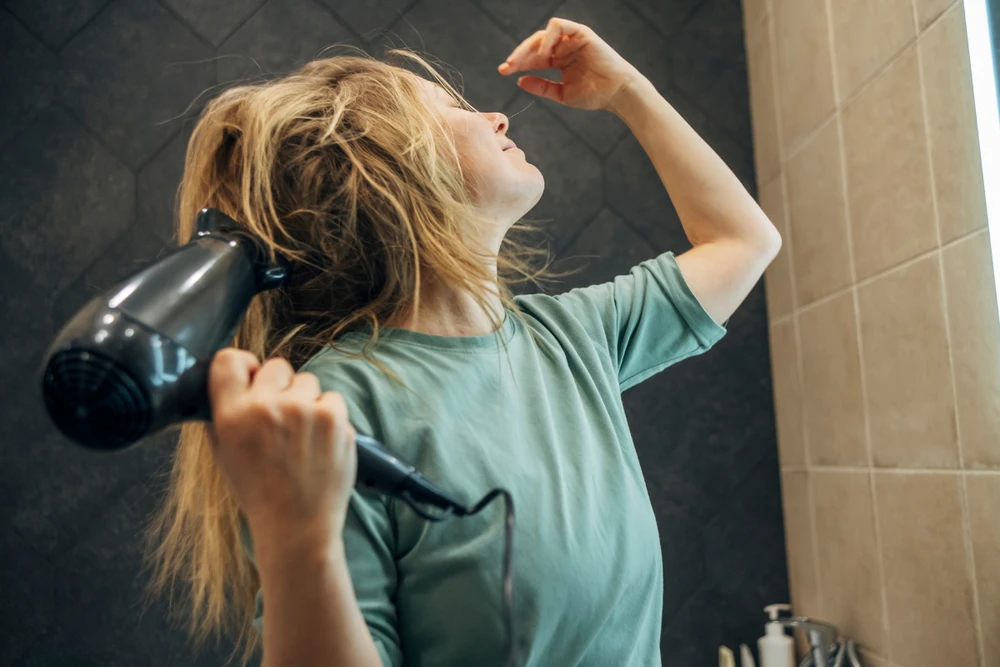Summary:
A dermatologist has issued a warning about the risks of not drying your hair after showering, calling it a “lazy” habit that can lead to serious scalp conditions and even hair loss. Dr. Aamna Adel explained that the scalp naturally hosts yeast and fungi, such as malassezia, which thrive in moist environments. Leaving hair damp for too long creates the perfect conditions for these organisms to overgrow, potentially causing seborrheic dermatitis (dandruff) or fungal infections like tinea capitis, which in severe cases can result in hair falling out.
While social media has sparked fears about “mouldy hair,” experts clarified that actual mould doesn’t grow on human hair. Instead, symptoms like flaky, red, or scaly patches may resemble mould but are signs of fungal imbalance. These issues are more common in colder months when hair dries slower. Treatment options include antifungal shampoos, creams, and in some cases, steroids. The key takeaway: always dry your scalp and hair after washing to prevent fungal growth and hair loss.
Worry has flooded online communities after experts warned hair care enthusiasts over the latest concern surrounding their precious locks.
Those who neglect to dry their hair after showering are in for a dire warning from a dermatologist, revealing that this seemingly harmless habit could lead to hair loss.
Moisture Creates Ideal Conditions for Fungus
The practice of leaving hair damp for extended periods creates ideal conditions for fungal to thrive on the scalp, according to medical experts.
But, despite social media fuelling concerns about “mouldy hair”, dermatologists have clarified that actual mould doesn’t grow on human hair.
However, the moisture from wet hair can trigger serious scalp conditions that mimic mould-like symptoms.
These fungal infections, if left untreated, can pose a genuine risk to hair health and retention.
Dr. Aamna Adel Explains the Science Behind the Risk
Explaining the science behind the risk to her TikTok followers, Dr Aamna Adel said:
“We, all of us, have natural yeast and fungus that lives on our skin and our scalp and it called a melassezia.”
She warned that fungus
“loves nothing more than moisture”
and those who are
“lazy when it comes to drying your hair after you wash it”
create ideal conditions for problems.
As a result, she advised followers:
“Always dry your hair after you wash your scalp.”
“You are creating a perfect storm, the perfect environment for this yeast to basically overgrow and that essentially leads to something called seborrheic dermatitis (aka dandruff),”
the skin expert added.
Most concerning, she cautioned that damp hair
“increases your risk of getting a fungal infection which is called tinea capitis and, trust me, you don’t want that on your scalp because, in its worst state, it can actually cause your hair to fall out.”

The “Mouldy Hair” Misunderstanding
Medical professionals have clarified that whilst actual mould cannot grow on human hair, the terminology has emerged from conditions that create mould-like appearances on the scalp.
The confusion derives from how certain fungal infections present themselves, with red inflammation, dry or scaly patches, and discoloured shedding skin resembling mould growth.
Our scalp naturally hosts a microbiome of bacteria, viruses and fungi that maintain healthy skin.
When this delicate balance is disrupted by prolonged dampness, it can lead to an overgrowth of yeast and subsequent dermatological conditions.
Cold Weather Can Make It Worse
These imbalances particularly occur during colder months when hair takes longer to dry naturally.
The most common condition mistaken for “hair mould” is seborrheic dermatitis, a chronic form of eczema affecting sebaceous gland-rich regions of the scalp.
Treatment Options Are Available
The condition ranges from mild dandruff to severe itchy, flaky rashes requiring medical intervention.
Treatment options include medicated shampoos, anti-fungal creams and steroids, depending on the severity of the case.
Warren Buffett Warns: Gold Needs ‘Ranks of the Fearful’ to Rise




